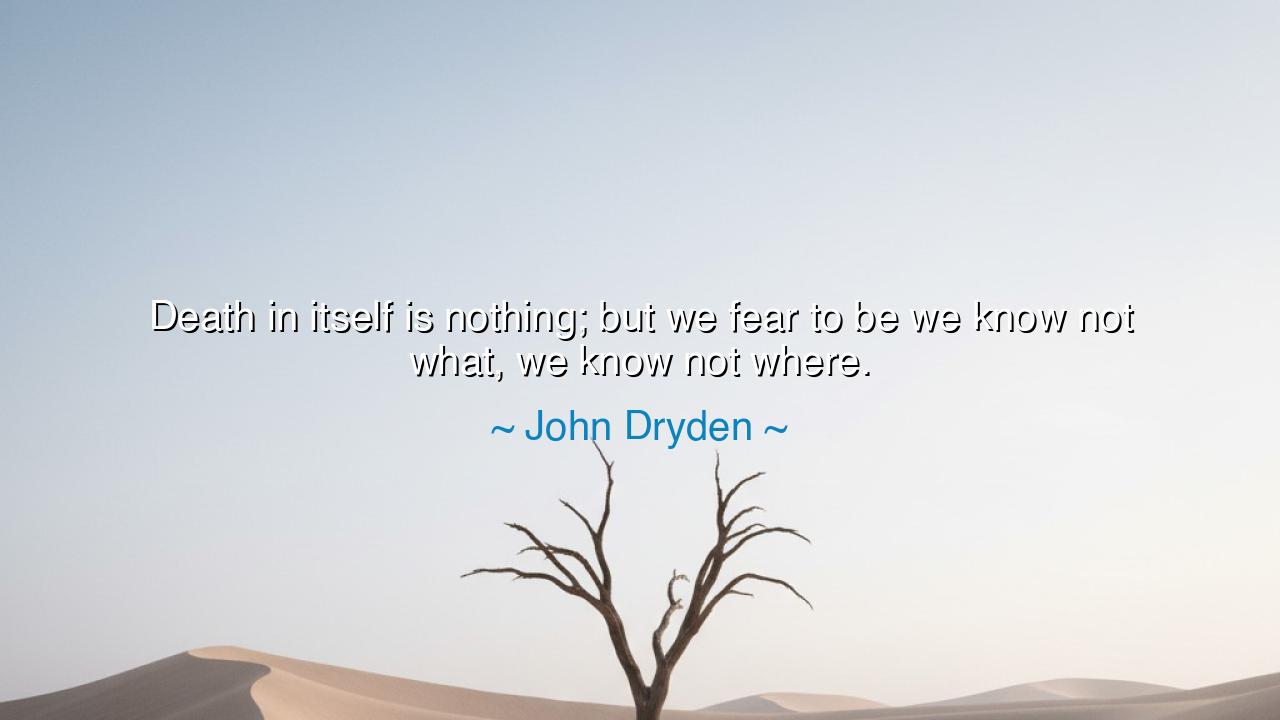
Death in itself is nothing; but we fear to be we know not what






“Death in itself is nothing; but we fear to be we know not what, we know not where.” — thus spoke John Dryden, the poet of England’s golden age, who like the philosophers of Greece and Rome, sought to pierce the veil that shrouds the human soul. In this profound reflection, Dryden gazes into the oldest mystery of mankind — death — and sees not a monster, but a mirror. He tells us that it is not death itself that terrifies us, but the unknowing — the shadowed vastness beyond life’s final breath. In those few words, he captures the essence of human dread: not the end of being, but the uncertainty of what comes after.
To the wise, this fear is as ancient as thought itself. From the dawn of civilization, man has stood trembling before the horizon of mortality, unable to see beyond it. The Egyptians filled their tombs with food, gold, and prayers to prepare for eternity. The Greeks imagined the River Styx and the Elysian Fields, while the Norse envisioned Valhalla for the brave and shadowy oblivion for the rest. Yet, across all cultures, the fear remains the same — not of nothingness, but of unknowing. For how does one face a journey when one cannot see the road, nor know the destination? Dryden, who lived in an age of religious transformation and philosophical doubt, understood that even the faithful tremble when asked to imagine “what” and “where” lies beyond the grave.
His words come from the play Aureng-Zebe (1675), where he gives voice to the universal trembling of the human condition. It is a meditation on mortality uttered by a character poised between power and ruin — a reflection of Dryden’s own world, where empires crumbled and certainties faded. The poet had seen enough of life’s impermanence to know that death, stripped of imagination, is simple — a ceasing of breath, a stillness. What torments us is the mind, which cannot bear the void, and so fills it with phantoms. Thus, death in itself is nothing, but the mind makes it everything.
The ancients wrestled with this same fear and sought wisdom to tame it. Epicurus, the philosopher of serenity, taught that “death is nothing to us,” for when we are, death is not, and when death comes, we are no more. Yet even he knew that logic alone could not still the trembling of the heart. For man is not made of reason alone — he is woven of dreams, faith, and longing. And so, as Dryden observes, we fear not the end, but the mystery that begins where our understanding ends. It is not death that haunts us — it is eternity, infinite and unknowable, that stands beyond the threshold.
Consider the tale of Socrates, condemned to die by hemlock. Surrounded by his disciples, he drank the cup calmly, saying that death was either a dreamless sleep or the beginning of a new existence. Yet even he, though fearless, admitted that he did not know which awaited him. His courage was not born of certainty, but of acceptance — of the understanding that man’s task is to live justly and die with dignity, regardless of what lies beyond. Here we see Dryden’s truth embodied: Socrates did not fear death, but neither did he pretend to know its face. He looked into the void with serenity, unafraid of being “we know not what, we know not where.”
Dryden’s insight carries a lesson both humbling and liberating. If death itself is nothing — a natural part of the great cycle — then the only true terror lies in our refusal to confront the unknown. The wise do not flee from mystery; they bow before it. For to live in constant fear of what may come is to die a thousand small deaths before the final one. To live fully is to accept that uncertainty is woven into the fabric of being, that not knowing is part of what makes us human. The soul’s courage, therefore, is not in conquering death, but in embracing the mystery beyond it.
So, O listener of tomorrow, take this wisdom as your guide: do not waste your life fearing the end, for the end is but a doorway, and its silence may be kinder than you imagine. Instead, fear only a life unlived — a spirit starved by hesitation and dread. Dryden’s words remind us that death, in its essence, is simple; it is life that is complex and precious. Therefore, live bravely in the face of mystery. When the time comes to depart, do not resist the current — step into it with the calm of one who knows that whatever awaits, it cannot undo the beauty of having lived. For though we may not know “what” or “where” we shall be, we can be certain of this: the soul that meets the unknown with courage has already tasted eternity.






AAdministratorAdministrator
Welcome, honored guests. Please leave a comment, we will respond soon